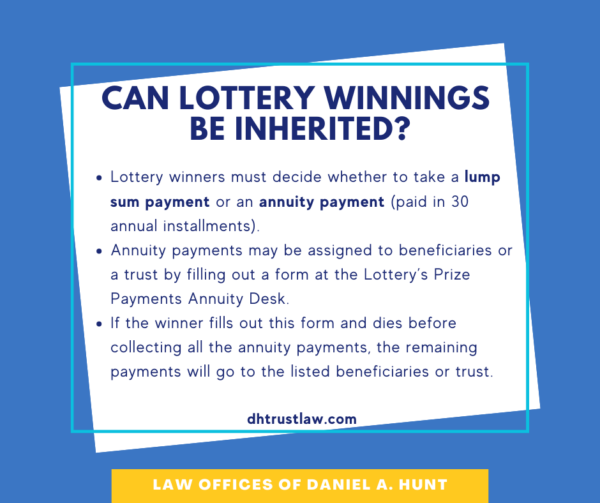Can Lottery Winnings Be Inherited?

Winning the lottery is a dream come true for most Californians. But what happens if a lottery winner passes away? Can lottery winnings be inherited? Here’s what you need to know about estate planning for lottery winners.
Estate Planning for Lottery Winners
Lottery winners must decide whether to take a lump sum payment or an annuity payment, which will be paid over 30 annual installments.
With a lump sum, the winner receives all the money at once, after taxes are withheld. This can be attractive for winners who wish to pay off large debts or invest their winnings over a long period of time.
A spendthrift prize winner who tends to make poor financial decisions may choose to receive the annuity payments instead. This option provides a long-term income stream and could help minimize financially irresponsible choices.
Whatever option they choose, the winner should consult with an experienced estate planning attorney to develop an estate plan that ensures their winnings will be directed as they wish when they die. Whether you want to care for loved ones or support a favorite charity, an estate plan enables you to leave a lasting legacy.
How to Minimize Taxes on Lottery Winnings
Lottery winners often end up with large estates that may be subject to federal estate taxes after their death. In 2023, the estate tax exemption is $12.92 million per individual or $25.84 million per married couple. The estate tax is 18 to 40 percent, depending on how much you have over the exemption.
To minimize taxes and maximize your heirs’ inheritance, consult with an estate planning attorney about strategies to reduce estate taxes. One of the best ways to minimize estate tax is to create an irrevocable trust.
What Kind of Trust is Best for Lottery Winnings?
An irrevocable trust called a blind trust tends to be most attractive to lottery winners seeking to preserve their privacy and their winnings. A blind trust is a trust established by an owner (the “trustor”) who gives another party (the “trustee”) full control of the trust.
Selecting a trustee such as a professional fiduciary to manage their finances can help preserve the winner’s anonymity and entrust their new fortune to a trustee with experience managing investment portfolios.
Irrevocable trusts also come with tax advantages and avoid probate upon the trustor’s death.
What Happens if The Winner Dies Before They Receive All the Payments?
What happens if the prize winner dies before they receive all the annuity payments? The winner should fill out a Lottery Beneficiary Designation Form from the Lottery’s Prize Payments Annuity Desk. By filling out this form, they can provide the California Lottery with the names of individuals who will receive any remaining payments as they come due.
The prize winner can change these beneficiaries at any time by completing a new Beneficiary Designation Form. If the prize winner dies and there’s no Lottery Beneficiary Designation Form on file, the Lottery will make payments according to established Lottery procedures or as ordered by the probate court.
If the prize winner dies before all the annuity payments have been made, the estate representative(s) must contact the Lottery’s Prize Payments Annuity Desk and begin the process of transitioning payments to the estate beneficiaries. Once complete, the remaining installment payments will be paid to the estate’s heirs. Be aware that the heirs cannot change the annuity payments to a lump sum cash option.
What If the Deceased Winner Created a Trust?
What happens if the prize winner created a trust before they died? The California Lottery will make installment payments to a qualifying trust if the settlor properly assigned the prize to the trust. After creating a trust, the trustor should fill out a Declaration and Assignment of Lottery Prize to Revocable Living Trust Form. This form is available at the Lottery’s Prize Payments Annuity Desk.
For the Lottery to make payments to a trust, the following conditions must be met:
- The prize winner must be the grantor of the trust
- The trust must be linked to the winner’s social security number
- The trust must be governed by California state laws
Upon a winner’s death, the successor trustee must notify the Lottery of the winner’s death and how the payments should be distributed under the trust. If the Declaration and Assignment of Lottery Prize form is not on file, the Lottery will make payments according to established Lottery procedures or as ordered by the probate court.
If you have any questions about lottery winnings being inherited or would like to create an estate plan, feel free to contact our law firm.
Law Offices of Daniel A. Hunt
The Law Offices of Daniel A. Hunt is a California law firm specializing in Estate Planning; Trust Administration & Litigation; Probate; and Conservatorships. We've helped over 10,000 clients find peace of mind. We serve clients throughout the greater Sacramento region and the state of California.




